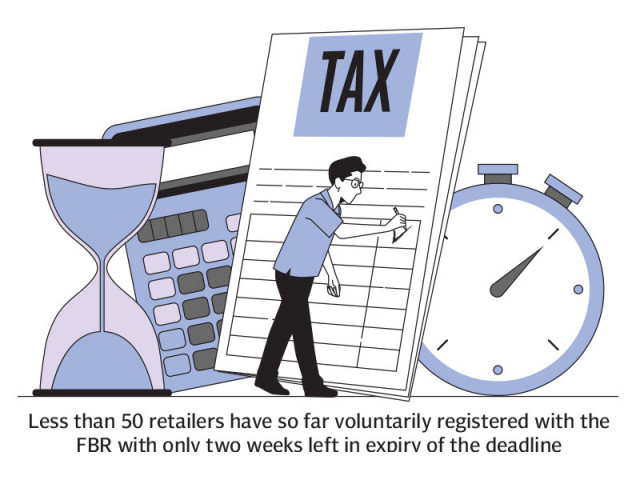Only 50 retailers register with FBR
Despite mass campaign on expanding tax net, govt drive remains unsuccessful

Less than 50 retailers have so far voluntarily registered with the Federal Board of Revenue (FBR) and only two weeks remaining before the deadline expires, underscoring the challenges facing the government in registering all retailers in six major cities.
Despite a mass campaign and Prime Minister Shehbaz Sharif’s focus on expanding the tax net to include traders, the government’s drive has thus far been unsuccessful. FBR sources reported that during the first two weeks of the campaign, fewer than 50 traders registered voluntarily.
This figure reflects the poor performance of the government and does not align with the resolve of PM Sharif and Finance Minister Muhammad Aurangzeb to bring traders into the tax net.
The registration scheme is viewed as the ruling party’s initial test of political will to broaden the narrow tax base. Prime Minister Shehbaz Sharif heads a fragile coalition government, which could also pose challenges in making politically tough economic decisions.
Construction, real estate, and the wholesale and retail sectors will also be the focus of the new International Monetary Fund (IMF) programme aimed at expanding the narrow tax base, according to sources. However, failure in any of these areas may result in additional burdens on the salaried class, already burdened by heavy taxation and constant double-digit inflation.
There is also a need to eliminate the 1% income tax on exporters and bring it in line with other economic classes.
Last month, the FBR issued a statutory regulatory order to implement the new scheme starting April 1, 2024. Dealers, retailers, manufacturer-cum-retailers, importer-cum-retailers, or any person involved in the supply chain of goods were given one month to register with the FBR.
Read FBR to bring stone crushing within tax net
This scheme applies to Karachi, Lahore, Islamabad, Rawalpindi, Quetta, and Peshawar, the major trade hubs in Pakistan. These six cities are centres of trading activity, with the FBR also having the largest workforce stationed there.
Previous attempts to bring traders into the tax net, including compulsory door-to-door registration during General Pervez Musharraf’s martial law period, have been unsuccessful. The poor performance during the first fortnight suggests that the government may once again fail to achieve the desired results.
It appears that retailers have not embraced the idea of voluntary registration, and past failures have reinforced their decision to remain outside the tax net. Any shortcomings in the scheme would also reflect poorly on the Special Investment Facilitation Council (SIFC), which has endorsed it.
There are an estimated 3.7 million retailers in Pakistan, but less than 300,000 of them are tax filers.
The FBR has mandated registration for traders and shopkeepers operating from fixed places of business, including stores, shops, warehouses, offices, or similar physical locations within the territorial civil limits, including cantonments, in the six cities. An FBR official noted that despite increased focus, there is insufficient human resources to pursue tax-evading citizens.
The scheme for registration and payment of minimum advance income tax became effective from April 1st. However, traders will make their first tax payments on July 15th, according to the notification.
The FBR stated that failure to register will result in forced registration by the FBR in its National Business Registry.
The FBR spokesperson was unavailable for comment.
Every trader is required to pay monthly advance tax by the 15th of each month. Even if a trader’s income is below the income tax threshold, they must pay a minimum of Rs1,200 per annum in income tax.
Traders have once again declined to step forward despite the government offering a 25% tax incentive for those who pay their full tax in advance before the due date or file income tax returns for the tax year 2023.
Tax returns for the tax year 2023 remained low at 4.4 million as of last month, compared to 5.9 million the previous year. Despite a steep economic slowdown, the FBR has thus far met its tax collection targets. For the month of April, its target is Rs707 billion, and during the first half, it collected Rs250 billion in taxes.
Sources indicated that one reason for the tepid response is the FBR’s failure to effectively exercise punitive powers against non-filers of income tax returns. Although the FBR has the authority to suspend the phone, electricity, and gas connections of non-filers, it has yet to disconnect the utility services of even a single person.
The FBR had identified about 2.4 million such non-filers and pledged to suspend the SIM cards of at least 500,000 individuals starting January of this year.
Published in The Express Tribune, April 17th, 2024.
Like Business on Facebook, follow @TribuneBiz on Twitter to stay informed and join in the conversation.


















COMMENTS
Comments are moderated and generally will be posted if they are on-topic and not abusive.
For more information, please see our Comments FAQ